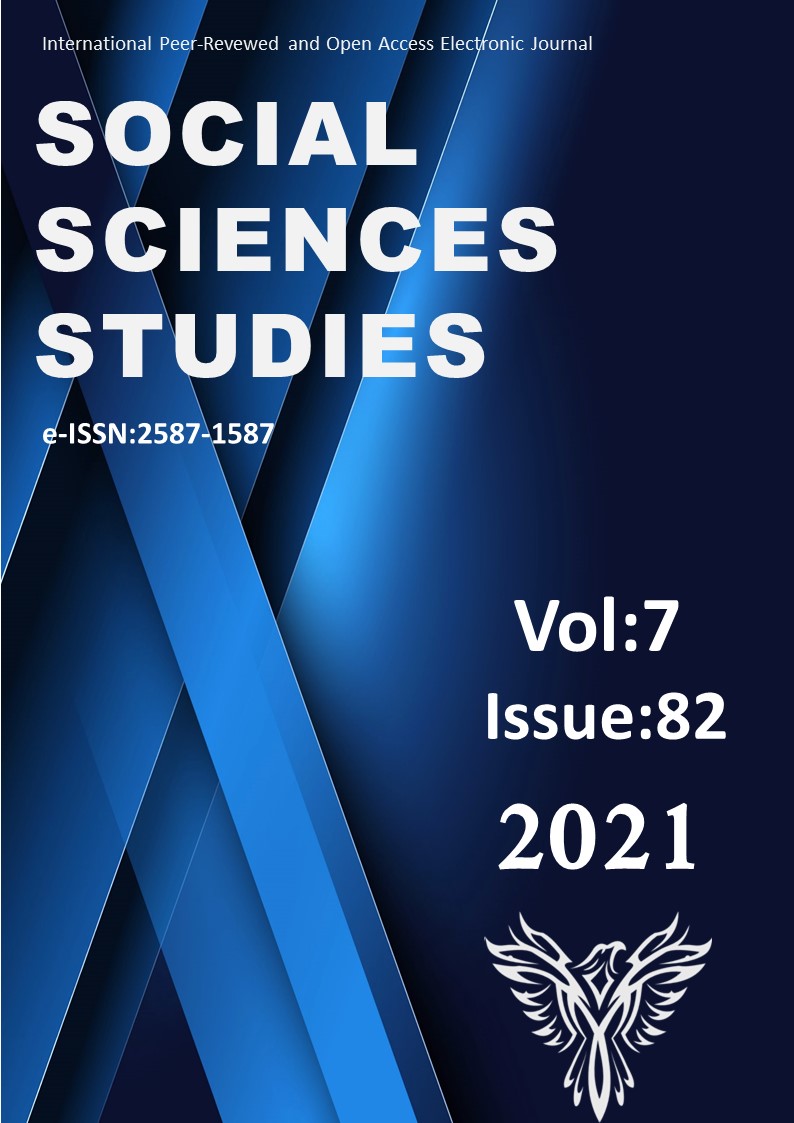Author :
Abstract
Bu araştırma fiilimsilerin çoklu zekâ destekli Türkçe dersi sunumuyla ilköğretim sekizinci sınıf öğrencilerine öğretilmesinde çoklu zekâ kuramının etkisini tespit etmek amacıyla yapılmıştır. Bu amaçla 2010-2011 eğitim öğretim yılı 1. döneminde, Trabzon Akçaabat Kavaklı İlköğretim Okulundan deney grubu (8-B ve 8-D sınıfı, 45 öğrenci) ve kontrol grubu (8-A ve 8-C sınıfı, 45 öğrenci) seçilerek toplam 90 öğrenciye uygulanmıştır. Random yoluyla belirlenen deney ve kontrol grubunda; öğrencilerin cinsiyetlerine, sayılarına ve Çoklu Zekȃ Formunun sonuçlarına göre denklik sağlanmıştır. Araştırmada, deney grubunda Çoklu zekâ kuramına (ÇZK) dayalı öğretimle ders sunumu; kontrol grubunda ise geleneksel öğretim ile sunum yapılmıştır. Araştırmada veri toplama aracı olarak araştırmacı tarafından hazırlanan ve 25 sorudan oluşan değerlendirme sınavı, öğretimin başında, öğretimin sonunda ve öğretimden 21 gün sonra (kalıcılığı ölçmek için) uygulanmıştır. Deney grubundaki öğrencilere dersler hakkında günlük yazmaları istenmiş ve öğrencilerin günlükleri de veri toplama aracı olarak kullanılmış ve üzerlerinde içerik analizi yapılmıştır. Ayrıca öğrencilerin derse karşı tutumunu belirlemek amacıyla tutum ölçeği uygulanmıştır. Veriler; gruplara ilişkin betimsel değerlerin puan ortalamaları arasındaki ikili karsılaştırmalar SPSS 17.0 programında “t” testi kullanılarak çözümlenmiştir. Araştırma sonucunda, Türkçe derslerinde Çoklu Zekȃ destekli ders sunumunun yapıldığı grubun geleneksel ders sunumunun yapıldığı gruba oranla daha başarılı olduğu ve ÇZK destekli ders sunumunun öğrenilen bilgilerin kalıcılığını ve öğrencilerin derse karşı ilgilerini artırdığı gözlemlenmiştir.
Keywords
Abstract
This research was conducted in order to determine the effect of multiple intelligence theory on the teaching of verbs to eighth grade students with the presentation of Turkish lesson supported by multiple intelligences. For this purpose, in the first semester of 2010-2011 academic year, the experimental group (8-B and 8-D class, 45 students) and the control group (8-A and 8-C class, 45 students) were selected from Trabzon Akçaabat Kavaklı Primary School. It was applied to 90 students. In the experimental and control groups determined randomly; equivalence was achieved according to the gender and number of the students and the results of the Multiple Intelligence Form. In the research, the presentation of the lesson in the experimental group with the teaching based on the theory of multiple intelligence (MUL); In the control group, a presentation was made with traditional teaching. As a data collection tool in the research, the evaluation exam consisting of 25 questions prepared by the researcher was applied at the beginning of the teaching, at the end of the teaching and 21 days after the teaching (to measure permanence). The students in the experimental group were asked to write a diary about the lessons and the diaries of the students were also used as a data collection tool and content analysis was performed on them. In addition, an attitude scale was applied to determine the students' attitude towards the course. Data; The pairwise comparisons between the mean scores of the descriptive values of the groups were analyzed using the "t" test in the SPSS 17.0 program. As a result of the research, it was observed that the group in which the Multiple Intelligence-supported course presentation was made in Turkish lessons was more successful than the group where the traditional course presentation was made, and the MLC-supported course presentation increased the retention of the learned information and the students' interest in the course.
Keywords
- Arıcı, B. & Ungan, S. (2021). “Fiilimsilerin Çoklu Zekâ Destekli Türkçe Dersi Sunumu İle Öğretimi” International Social Sciences
- Studies Journal, (e-ISSN:2587-1587) Vol:7, Issue:82; pp:1959-1966 FİİLİMSİLERİN ÇOKLU ZEKÂ DESTEKLİ TÜRKÇE DERSİ SUNUMU İLE ÖĞRETİMİ 1 Teaching Gerundials With Multiple Intelligence Supported Turkish Lesson Presentation Dr. Öğr. Üyesi. Bayram ARICI Muş Alparslan Üniversitesi Eğitim Fakültesi Türkçe ve Sosyal Bilimler Eğitimi Bölümü, Muş/Türkiye ORCID ID: https://orcid.org/0000-0001-7213-1331 Prof.Dr. Suat UNGAN Trabzon Üniversitesi, Eğitim Fakültesi, Türkçe ve Sosyal Bilimler Eğitimi Bölümü, Trabzon/Türkiye ORCID ID: https://orcid.org/0000-0003-4020-6655, ÖZET Bu araştırma fiilimsilerin çoklu zekâ destekli Türkçe dersi sunumuyla ilköğretim sekizinci sınıf öğrencilerine öğretilmesinde çoklu zekâ kuramının etkisini tespit etmek amacıyla yapılmıştır. Bu amaçla 2010-2011 eğitim öğretim yılı 1. döneminde, Trabzon Akçaabat Kavaklı İlköğretim Okulundan deney grubu (8-B ve 8-D sınıfı, 45 öğrenci) ve kontrol grubu (8-A ve 8-C sınıfı, 45 öğrenci) seçilerek toplam 90 öğrenciye uygulanmıştır. Random yoluyla belirlenen deney ve kontrol grubunda; öğrencilerin cinsiyetlerine, sayılarına ve Çoklu Zekȃ Formunun sonuçlarına göre denklik sağlanmıştır. Araştırmada, deney grubunda Çoklu zekâ kuramına (ÇZK) dayalı öğretimle ders sunumu; kontrol grubunda ise geleneksel öğretim ile sunum yapılmıştır. Araştırmada veri toplama aracı olarak araştırmacı tarafından hazırlanan ve 25 sorudan oluşan değerlendirme sınavı, öğretimin başında, öğretimin sonunda ve öğretimden 21 gün sonra (kalıcılığı ölçmek için) uygulanmıştır. Deney grubundaki öğrencilere dersler hakkında günlük yazmaları istenmiş ve öğrencilerin günlükleri de veri toplama aracı olarak kullanılmış ve üzerlerinde içerik analizi yapılmıştır. Ayrıca öğrencilerin derse karşı tutumunu belirlemek amacıyla tutum ölçeği uygulanmıştır. Veriler; gruplara ilişkin betimsel değerlerin puan ortalamaları arasındaki ikili karsılaştırmalar SPSS 17.0 programında “t” testi kullanılarak çözümlenmiştir. Araştırma sonucunda, Türkçe derslerinde Çoklu Zekȃ destekli ders sunumunun yapıldığı grubun geleneksel ders sunumunun yapıldığı gruba oranla daha başarılı olduğu ve ÇZK destekli ders sunumunun öğrenilen bilgilerin kalıcılığını ve öğrencilerin derse karşı ilgilerini artırdığı gözlemlenmiştir. Anahtar Kelimeler: Çoklu Zekȃ Kuramı, Türkçe Eğitimi, Türkçe Dersine İlişkin Tutum, Fiilimsiler (Eylemsiler). ABSTRACT





